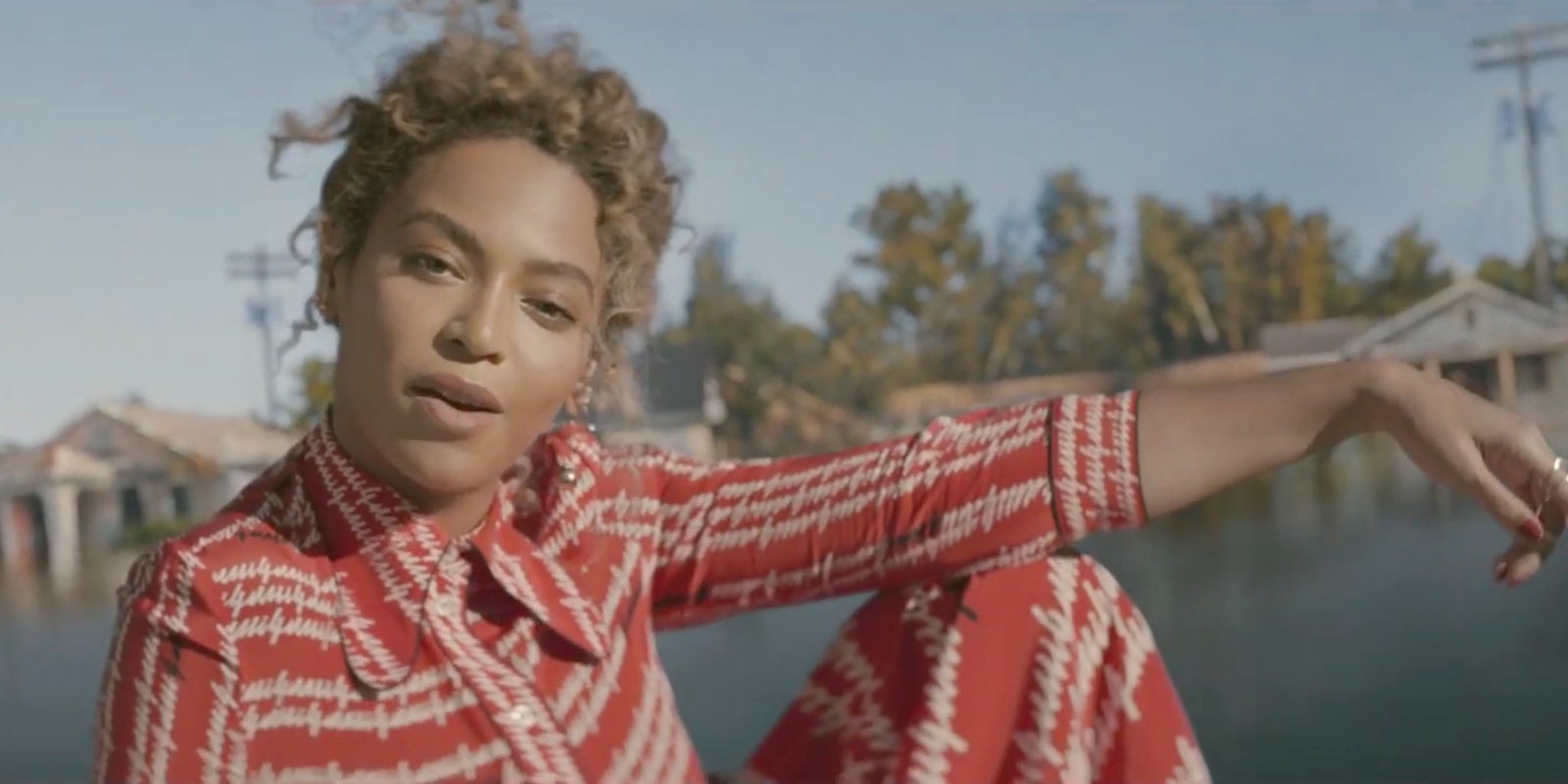This lemonade recipe calls for a mixture of cornrows, side chicks, daddy issues, and of course black girl magic. Throw in a cheating Jay Z and you’ve got Beyoncé’s sixth studio album.
Lemonade is a front-row seat into her marriage, family history, and an education on what it means to be a black woman in America. The queen released it with an hour-long special on HBO Saturday. It finds Mrs. Carter in her prime, wielding a high-impact album that stands among her best.
We’ve seen Beyoncé’s sound and artistry develop over the past decade from sexy, soulful albums like Dangerously in Love and B’Day, to clunkers like her worst-selling release 4. Now she’s paid her pop dues, is executive producer of her own records, and can say whatever the hell she wants.
From producers like Diplo, Mike Will Made It, and Rae Sremmurd; to Billboard hitmakers Kendrick Lamar and The Weeknd; to British electronica star James Blake; to Jack White, this is Beyoncé’s most expansive album to date.
And while Lemonade doesn’t have as many upbeat, twerk-what-your-mama-gave-you bangers, its risk-taking musical composition almost always connects.
Some songs need the help of the HBO special for impact, while others play just as well going 80 miles per hour on a Texas freeway. The record opens with “Pray You Catch Me,” a contemporary ballad adorned with simple piano chords and an in-studio orchestra. It sets the tone for the depth of emotion, truth, and theatrics provided by the rest of the album. And with verse one she dives right into the infidelity that fuels it:
You can taste the dishonesty
It’s all over your breath as you pass it off
She wants to catch him in the act. She’s praying for concrete evidence.
Prayin’ to catch you whispering
I’m prayin’ you catch me listening
It’ll have you in your feelings, nearly texting an ex. From there “Hold Up” brings an upbeat, flirtatious bass line that sounds tropical and girly. Whoever Jay is messing around with is clearly a waste of time and isn’t worth jeopardizing their union, Beyoncé argues.
Bey uses this song to reiterate her worth, conceding that she can get “jealous and crazy” in a hot second. She spares no details in calling Jigga all the way out:
Let’s imagine for a moment that you never made a name for yourself
Or mastered wealth, they had you labeled as a king
But it’s only a warm-up for “Don’t Hurt Yourself.” Featuring the former White Stripes leader, she uses this drum-kit-pulverizing ‘90s rock track to threaten divorce, claim her boss-bitch position, and even call God a woman:
You ain’t married to no average bitch, boy
You can watch my fat ass twist, boy
As I bounce to the next dick, boy
And keep your money, I got my own
White joins her on the chorus to bring the message home. With bad grammar and bold indictments, this song gives a firsthand account of what this mom, wife, and full-time icon has to say to the man she married. “If you try this shit again, you gon lose your wife,” she warns.
The energetic, quirky “Sorry” will probably be the next single. On my drive in from Houston on Monday, this girl-power anthem was requested twice on the radio. “Niggas In Paris” producer Hit-Boy grounds the curveball album in modern hip-hop. It’s here that Bey whispers the album’s instantly iconic, Internet-witch-hunt lyric about “Becky with the good hair.”
And after she uses the first half of the album to deal with the cheating, she takes the second half to asses how she overcame struggles in her marriage in the name of family and love. The piano ballad “Sandcastles” talks about the sorrow of promises broken in a marriage, and how unconditional love can withstand the weathering of mistakes made.
The music video actually features her and Jay Z. Whether it’s for theatrics or not, Beyoncé has never given this much access to her personal life in a song.
But her most personal album doubles as Bey’s most political. Kendrick Lamar hops on “Freedom” and puts black liberation front and center. Allusions to slavery and images of current-day systematic oppression go live in this Just Blaze-produced, organ-tinged, belting centerpiece. (Its accompanying video features Trayvon Martin’s mother, and is set on a plantation.)
When the smoke clears, “All Night” brings her storyline from the breakup to the makeup portion. Suggesting she may have spent some time alone amid infidelity, Beyoncé takes this song to reclaim her love for her family and husband. She talks about regaining trust and repairing something she thought was broken. She stumps for not taking the easy way out on something that’s taken a lifetime to build.
Lemonade encompasses Beyoncé’s identity and intersectionality as a wife, mom, and as a black woman who can and will do away with respectability politics. She has issues in her family (“Daddy Lessons”) and her marriage that money can’t fix or make go away. And the album breaks the seal into personal elements fans have been waiting to hear about. She’s all the more relevant and relatable as she pours out her truth.


